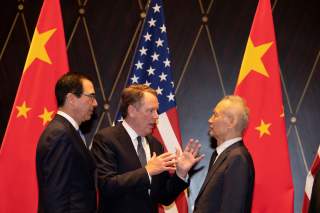Who's Winning the Trade War? Economists Speak Out
You'd be surprised by their answers.
Americans paid $6.8 billion in tariffs in July, reported CBS News, citing data from Tariffs Hurt the Heartland.
Since the start of the trade war, farmer suicide rates and foreclosures have drastically increased, Forbes reported Aug. 30.
“We, as farmers, are losing,” North Dakota Farmers Union President Mark Watne told the DCNF, adding that prices for agricultural exports to China have increased significantly, so farmers are selling fewer goods and, as a result, not even subsidies cover half of what farmers need to “sustain the family farm” as the trade war continues.
He explained that farmers are being penalized even though they were never the problem, and the hunger for free trade has overshadowed the importance of safeguarding fair trade.
“We have to meet with Europe, Japan, make friends with them again and come together to address the threat of China,” he said, adding that the U.S. should never have gone into a trade war with the second-largest economy in the world without asking for help from other countries first.
Tariffs are hurting auto production, too, as China is the second-biggest exporter of vehicle parts to the U.S. next to Mexico, according to the South China Morning Post.
The Motor Equipment Manufacturers Association (MEMA), which represents motor vehicle parts manufacturers and remanufacturers, said that while MEMA “supports the administration’s push for robust IPR protection in China, adding a 5% [tariffs] to already existing 25% ad valorem rate of duties on these parts and equipment imported by our members from China is not the solution to these problems” in a Sept. 20 statement.
“MEMA does not agree that the imposition of tariffs is an effective or viable solution to China’s intellectual property and licensing issues. … There is no evidence that applying tariffs to these products will address any of the concerns that China misappropriated intellectual property, and therefore MEMA believes that these products should be excluded from USTR’s list,” the statement continued.
A potential solution
Watne, Gold, Tori Whiting and other experts said the president should take the issue of China’s “seven deadly sins” to the World Trade Organization (WTO) and involve the efforts of other foreign nations to stop the country’s bad trading behavior. They also said the administration should take advantage of the Treasury Department’s ability to sanction businesses and individuals.
“The way the president has addressed these concerns in hurting Americans rather than helping them,” Whiting, a trade economist the Heritage Foundation, told the DCNF.
The trade war was initially marketed by the president as short-term pain for long-term gain, but it’s been nearly two years, and “Americans are in a much worse place now than we were before the trade war,” she said.
“It’s more expensive and more difficult to buy and sell with China than it was two years ago,” Whiting continued, adding that Trump’s “intentions were good but strategies are failing.”
The Heritage Foundation “recommends the administration use different mechanism to deal with China,” such as taking more cases to the WTO.
When the U.S. takes cases with China to the WTO, Whiting said, “We almost always win and China almost always changes its behavior. China is a member of the WTO, and they want to maintain their status with the WTO. China knows the WTO rules, and they know how to go around the rules and get caught later.”
“It’s other countries’ responsibility to bring concerns to the WTO,” she added. “The Heritage Foundation has recommended solutions that would really be more effective: We can address these issues without taxing the American people. It should be, in my opinion, the role of the government — if they are going to engage in these issues — as little negative impact on the American people and the economy as possible.”
Content created by The Daily Caller News Foundation is available without charge to any eligible news publisher that can provide a large audience. For licensing opportunities of our original content, please contact [email protected].
Image: Reuters.

